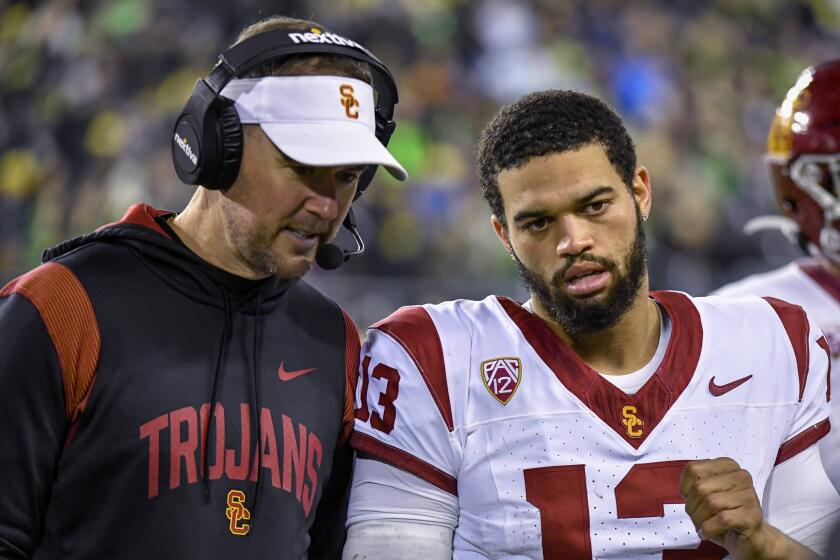Clemens is star attraction at hearing
WASHINGTON -- Barry Bonds will not appear before Congress on Wednesday. Roger Clemens will be the star baseball player under oath, and he has vowed to testify he never used steroids.
But as Bonds awaits trial on charges that he lied under oath when he told a federal grand jury he had never knowingly used steroids, the credibility of those charges could be enhanced or weakened by how Clemens emerges from his testimony, according to one House member who will hear him Wednesday.
“Roger Clemens has the most to reconcile,” Rep. Mark Souder (R-Ind.) said. “And, if he’s innocent, it may be that Bonds is as well.”
Souder sits on the House Oversight and Government Reform Committee, which has summoned Clemens and Brian McNamee, the trainer who said he injected Clemens with steroids and human growth hormone, to the hearing. Clemens has denied the claim and filed a defamation suit against McNamee.
The 41-member committee also has taken sworn depositions from Clemens’ former teammates, Andy Pettitte and Chuck Knoblauch, each of whom McNamee said he injected with HGH. Pettitte has corroborated McNamee’s statement about him; Knoblauch has not commented publicly.
As federal investigators followed the BALCO trail beyond Bonds, they identified former Mets clubhouse attendant Kirk Radomski and then McNamee as suppliers of performance-enhancing substances to major leaguers. McNamee made his statements about Clemens, Pettitte and Knoblauch to federal agents -- including Jeff Novitzky, the lead BALCO investigator.
The committee announced Monday night that Pettitte, Knoblauch and Radomski would not testify at the hearing. “Mr. Knoblauch and Mr. Pettitte answered all the committee’s questions and their testimony at the hearing is not needed,” the committee said in a statement. Radomski was excused from his deposition.
If Clemens can refute McNamee’s claims, Souder suggests, that could cast doubt on the investigators who decided McNamee was credible -- essentially the same ones who decided Bonds was not.
That also could cast doubt upon the legitimacy of Sen. George Mitchell’s report on baseball’s steroid era, because Radomski and McNamee provided most of the new information in the report.
Amid contentions by Clemens’ attorneys that Mitchell failed to corroborate elements of McNamee’s statements, the committee also announced Monday that Mitchell investigator Charlie Scheeler would testify Wednesday as well.
“In effect, Clemens challenged the validity of the entire effort,” Souder said.
That challenge could result in another investigation, one that could potentially lead to perjury charges.
Three committee members -- Rep. Elijah Cummings (D-Md.), Rep. Danny Davis (D-Ill.) and Rep. Betty McCollum (D-Minn.) -- said they would support referring the matter to the Justice Department, assuming Wednesday’s testimony of Clemens and McNamee cannot be reconciled.
The hearing is titled “The Mitchell Report: The Illegal Use of Steroids in Major League Baseball, Day 2” and was originally scheduled for the day after Mitchell, Commissioner Bud Selig and players’ union executive director Donald Fehr testified last month.
The committee chairman, Rep. Henry Waxman (D-Beverly Hills), declined to discuss the specific purpose of the hearing but issued a statement noting the committee’s “long-standing interest” in drug abuse.
“We have found what happens in professional sports is often imitated by high school athletes,” Waxman said. “We need to sever that link and do all we can to get the hundreds of thousands of teenagers using these drugs to stop.”
Another committee member, Rep. Bill Sali (R-Idaho), said Clemens’ appearance was “only one facet of the committee’s efforts to review the findings of the report,” despite an apparent focus on Clemens.
“If there is real evidence, let him be tried in a court of law, not by a congressional panel,” Sali said.
Rep. Darrell Issa (R-Vista), another panel member, said the hearing “has not yet justified its reason for being.”
Said Issa: “If the purpose of this hearing is to examine criticisms about the conclusions and methods of the Mitchell Report, I do not understand why relevant individuals like Commissioner Bud Selig and/or Sen. Mitchell are not testifying again to respond to criticisms that may be raised.”
McCollum said Clemens and McNamee can “clarify their respective roles in this scandal,” as documented by Mitchell’s findings. She said his report “clearly demonstrated that Major League Baseball has been filled with injecting drug users, dope-pushing trainers, profit-mongering owners and an apologist of a commissioner.”
In his report, and again in his testimony before Congress, Mitchell said federal drug prosecutions generally target dealers and suppliers, not users. Cummings said that policy should not spare Clemens from testifying, or any player from prosecution.
“I’ve got people in my neighborhood sitting in jail for using crack cocaine,” Cummings said. “We need to show some consistency. If somebody is violating the law -- by using steroids, crack cocaine or anything else -- he should be subject to the justice system.”
Congress could refer Clemens or McNamee to the Justice Department without the public hearing.
“We don’t need the hearings for this, do we?” said Larry Sabato, director of the University of Virginia Center for Politics. “The legal authorities could pursue it.
“Why is it that this takes up the time and attention of Congress when we have at least two foreign wars, a crumbling economy and lots of other major problems? The answer is because we must have bread and circuses.”
That kind of criticism echoes from talk shows and sports columnists, and even privately from some in baseball’s New York headquarters. McCollum, for one, rejects that criticism.
“Illegal drug use in baseball is a scandal that has a tremendously negative effect on young people,” she said. “And, if the level of media attention given to baseball as compared to major national issues is any indication, a good number of people clearly consider baseball a greater priority than many of the issues Congress is presently working on.”
Indeed, ESPN does not provide gavel-to-gavel coverage of hearings on the Iraq war.
“Your constituents will see you in action,” Sabato said. “Ninety-nine percent of what members of Congress do gets no attention. This will get more attention for some of them than they’ve ever had.”
--
Times staff writer Ben DuBose contributed to this report.
Hearing coverage
Wednesday’s hearing by the House Oversight and Government Reform Committee on steroid use in baseball begins at 7 a.m. PST. It will be televised live on ESPN, ESPNews and C-SPAN3.
More to Read
Go beyond the scoreboard
Get the latest on L.A.'s teams in the daily Sports Report newsletter.
You may occasionally receive promotional content from the Los Angeles Times.











